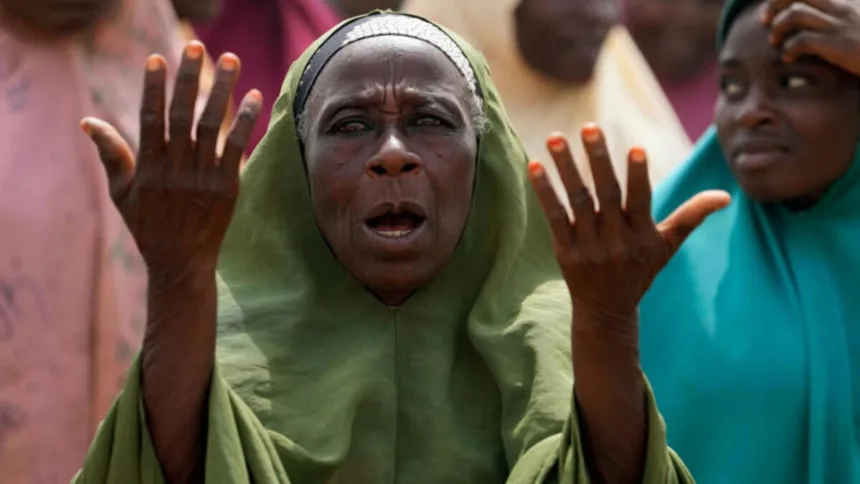Rashidat Hamza feels hopeless. Her six children, all but one, are among the almost 300 pupils kidnapped from their school in the northwest of Nigeria, a region rife with armed gangs and Islamic extremists.
Her children, who range in age from 7 to 18, were abducted by gunmen after they left their remote Kaduna state school more than two days ago. On Saturday, she was still astonished. Authorities reported that among the kidnappees in the state notorious for horrific killings, anarchy, and treacherous routes where people are frequently kidnapped were at least 100 children, 12 years of age or younger. During a visit to the town, Hamza told The Associated Press, “We don’t know what to do, but we believe in God.”
The mass kidnapping in Kuriga was the third in northern Nigeria since last week; a few days earlier, 200 people—mostly women and children who had been displaced by conflict—were abducted in northeastern Borno State. A group of gunmen also kidnapped 15 children from a school in another northwest state, Sokoto, before dawn on Saturday. The kidnappings serve as a clear reminder of the security issue that the most populous nation in Africa is now facing. Not a single organization took credit for any of the most recent kidnappings. The abductions from schools are attributed by the locals to herders at odds with the established settlements.
The world has been shocked by a Nigerian student abduction before. More than 200 schoolgirls were kidnapped by Islamic militants in 2014 from Chibok, Borno, which sparked the international #BringBackOurGirls social media movement. Ten years later, comparable circumstances have resulted in the kidnapping of at least 1,400 Nigerian kids from their schools. Many remain in captivity, including about one hundred of the Chibok girls. Teacher Nura Ahmad told the AP that gunmen “came in dozens, riding on bikes and shooting sporadically” as the pupils at the government primary and secondary school were just getting settled into their classrooms on Thursday, the day of the kidnapping.
Nestled between savannah and trees, the LEA Primary and Secondary School is one of the few schools in the area. It is located near the town’s entrance, by the road. Its walls and roof were in ruins, yet despite this, it offered parents hope for a brighter future for their kids. In order to stop assistance from arriving, “they surrounded the school and blocked all passages… and roads,” Ahmad claimed. In less than five minutes, the kids were taken away. Abdullahi Usman, at fourteen, braved gunfire to get away from his kidnappers.
According to Abdullahi, “those who refused to move quickly were either forced on the motorcycles or threatened with gunshots fired into the air.” He exclaimed, “The bandits were yelling, Go! Go! Go!” Searching the forested areas of northwest Nigeria could take weeks, according to experts, despite the fact that Nigerian police and troops began combing the trees on Friday in an attempt to find the missing children. The father of one of the 13-year-old boys kidnapped, Shehu Lawal, claimed, “My brain has been muddled since this happened.” “My child left without even eating breakfast. “After learning the news, his mother passed out,” he claimed.
Lawan Yaro, whose five grandchildren are among the kidnapped, is one of the people who claims that their expectations are already dwindling. The unpredictability of the area is nothing new, he noted, “but it has never been this manner.” “We are in tears, asking God and the government for help, but the gunmen will decide whether or not to bring the kids back,” Yaro remarked. “God will provide for us.” However, targeting are not limited to schools.
The Armed Conflict Location and Event Data Project reports that over 3,500 persons have been kidnapped in Nigeria during the past 12 months. Some were even taken from their residences in Abuja, the nation’s capital. President Bola Tinubu successfully ran on a platform of stepping up security and putting an end to kidnappings, and he assumed office last year.
Experts claim that it is simple to transport weapons—which are often used in kidnappings—through Nigeria’s lax border controls. For example, the majority of its 1,500-kilometer (932-mile) border with Niger crosses through the northwest. The area is primarily covered in woodland savannah, but it also includes large, uninhabited forests where organized crime groups hide and hold their kidnapped victims. A bill to criminalize ransom payments was enacted by Congress in 2022, but Nigerian kidnappers are notorious for their cruelty, compelling many families to give in to their demands.
The 14-year Islamist insurgency in the northeast has worn out Nigeria’s military, which yet conducts airstrikes, SMOs, and responds to crisis areas around the nation. In the area where many people live in poverty, armed gangs also continue to grow and collaborate with extremists in an effort to broaden their sphere of influence. According to past statements from the military, abduction victims are occasionally used as “human shields” to stop aircraft bombardments of the jungles where their captors hide.
According to James Barnett, a West African specialist researcher at the Hudson Institute in the United States, the gangs are “adjusting their strategies and further entrenching themselves in the northwest through extortion.” “They believe that they should be free to do as they please in the northwest and that they will have to respond and demonstrate their strength if the state challenges them, either directly or indirectly,” Barnett said.
Kuriga town to Kaduna is connected by a hazardous 55-mile (89-kilometer) route that is dotted with more than a dozen checkpoints and military trucks. But, contingent on security requirements, it is conceivable that the soldiers will be redeployed soon. Kuriga residents can only hope that the safety they currently experience from military soldiers persists and that their children return unharmed. The mother of five abducted children, Hamza, is hoping the authorities would apprehend the abductors and retrieve her children. “There is no peace among us because of the gunmen.”
Read More: Boeing 737 Max Emergency Landing in Houston: Investigation Underway






